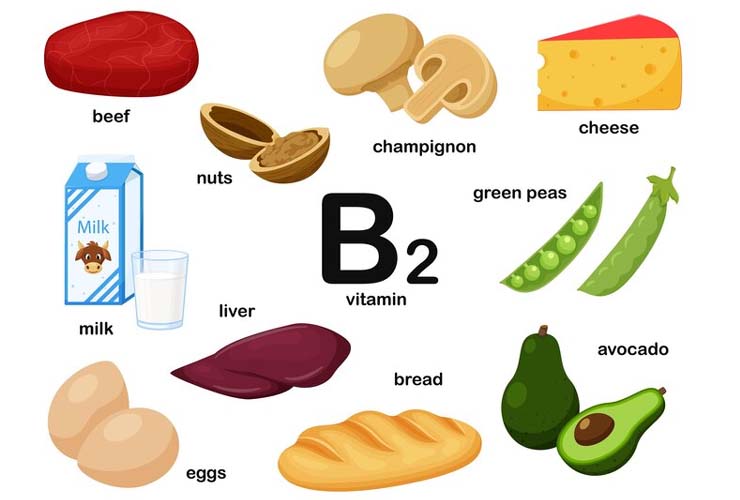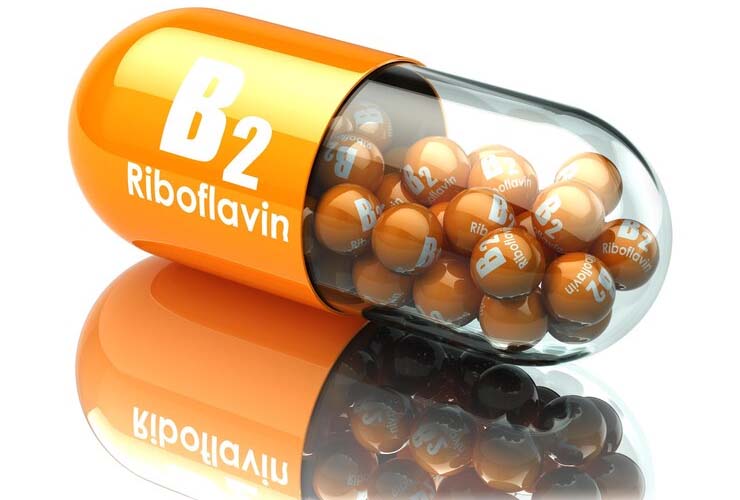Riboflavin(vitamin B2): Importance, Food Sources, Deficiency and Supplementation
May 24, 2023 | by Yashaswi Pathakamuri | Posted in B vitamins
Riboflavin, also known as vitamin B2, is an essential nutrient that plays a vital role in maintaining overall health. It is a water-soluble vitamin that cannot be produced by the body, so it must be obtained through diet or supplements. Riboflavin is involved in various metabolic processes, including the conversion of food into energy.
It acts as a cofactor for enzymes that participate in the metabolism of carbohydrates, proteins, and fats. Additionally, riboflavin is crucial for the production of red blood cells, cellular growth and repair, and the maintenance of healthy skin, hair, and nails. It also functions as an antioxidant, helping to neutralize harmful free radicals and protect cells from oxidative damage.
Good dietary sources of riboflavin include milk, eggs, lean meats, green leafy vegetables, and fortified cereals. A deficiency in riboflavin can lead to symptoms such as fatigue, skin disorders, and impaired growth. Therefore, ensuring an adequate intake of riboflavin is essential for optimal health and well-being.
Recommended Intake
The recommended intake of riboflavin, or vitamin B2, can vary depending on factors such as age, gender, and life stage. The following are the recommended daily allowances (RDAs) for riboflavin according to the United States National Institutes of Health (NIH):
- Infants:
- 0-6 months: 0.3 milligrams (mg) per day
- 7-12 months: 0.4 mg per day
- Children:
- 1-3 years: 0.5 mg per day
- 4-8 years: 0.6 mg per day
- 9-13 years: 0.9 mg per day
- Adolescents and Adults:
- Males aged 14 years and older: 1.3 mg per day
- Females aged 14-18 years: 1.0 mg per day
- Females aged 19 years and older: 1.1 mg per day
- Pregnancy and Lactation:
- Pregnant females: 1.4 mg per day
- Lactating females: 1.6 mg per day
It’s important to note that these values represent the RDAs, which are set to meet the needs of the majority of healthy individuals in a particular population group. Individual requirements may vary based on factors such as overall health, activity level, and specific medical conditions. It is best to consult with a healthcare professional or registered dietitian for personalized recommendations regarding riboflavin intake.
Why is Riboflavin Important?
Riboflavin is a type of B vitamin. It is water soluble, which means it is not stored in the body. Water-soluble vitamins dissolve in water. Leftover amounts of the vitamin leave the body through the urine. The body keeps a small reserve of these vitamins.
Riboflavin is important for several reasons:
1. Energy Production
Riboflavin is a key component of various enzymes involved in the metabolism of carbohydrates, proteins, and fats. It helps convert these macronutrients into usable energy for the body. Adequate riboflavin levels are essential for maintaining optimal energy production and preventing fatigue.
2. Growth and Development
Riboflavin is necessary for normal growth, development, and maintenance of body tissues. It supports the production of new cells and the repair of damaged tissues. Riboflavin is particularly important during periods of rapid growth, such as childhood and adolescence.
3. Red Blood Cell Production
Riboflavin is involved in the synthesis of red blood cells, which are responsible for transporting oxygen to tissues and removing carbon dioxide. Sufficient riboflavin levels are essential for the proper maturation and functioning of red blood cells, ensuring efficient oxygen delivery throughout the body.
4. Antioxidant Defense
Riboflavin acts as an antioxidant, helping to protect cells from oxidative damage caused by free radicals. Free radicals are unstable molecules that can harm cells and contribute to various diseases. Riboflavin supports the regeneration of other antioxidants, such as glutathione, enhancing the body’s antioxidant defense system.
5. Eye Health
Riboflavin plays a role in maintaining healthy vision. It helps protect the lens of the eye from oxidative stress and supports the overall health of the eyes. Adequate riboflavin intake may help reduce the risk of conditions such as cataracts and age-related macular degeneration.
6. Skin, Hair, and Nail Health
Riboflavin contributes to the maintenance of healthy skin, hair, and nails. It is involved in the production of collagen, a protein that provides structure and elasticity to the skin. Riboflavin deficiency can lead to skin disorders, such as dermatitis or dry, cracked skin.
Overall, riboflavin is essential for various physiological processes in the body, including energy production, growth, red blood cell production, antioxidant defense, and the maintenance of healthy eyes, skin, hair, and nails. Adequate riboflavin intake through a balanced diet or supplementation is necessary to support optimal health and well-being.
Food Sources
Riboflavin, or vitamin B2, can be found in a variety of foods. Here are some common food sources of riboflavin:

- Dairy Products: Milk, yogurt, and cheese are good sources of riboflavin. For example, one cup of milk can provide around 0.3-0.4 mg of riboflavin.
- Meat and Poultry: Lean meats such as beef, pork, and lamb contain riboflavin. Poultry, including chicken and turkey, is also a source of riboflavin.
- Fish and Seafood: Fish like salmon, trout, and tuna are rich in riboflavin. Other seafood options such as shrimp and mussels also contain this vitamin.
- Eggs: Both the egg white and yolk contain riboflavin. One large egg provides approximately 0.2-0.3 mg of riboflavin.
- Legumes: Legumes like lentils, chickpeas, and black beans are good sources of riboflavin, offering approximately 0.2-0.3 mg per cup when cooked.
- Green Leafy Vegetables: Vegetables such as spinach, kale, and broccoli contain riboflavin. A cup of cooked spinach provides around 0.4-0.5 mg of riboflavin.
- Whole Grains: Whole grain products like bread, rice, and pasta can contribute to riboflavin intake. Check the packaging or labels to ensure they are fortified with riboflavin.
- Fortified Cereals: Many breakfast cereals are fortified with riboflavin and other essential nutrients. Be sure to choose cereals that specifically mention riboflavin on the packaging.
It’s important to note that the riboflavin content in foods can vary depending on factors such as the cooking method and processing. To ensure an adequate intake of riboflavin, it is recommended to consume a varied and balanced diet that includes a combination of these food sources.
Deficiency
Riboflavin deficiency, also known as ariboflavinosis, can occur when there is an inadequate intake or absorption of riboflavin. Here’s some information about riboflavin deficiency:
Causes:
- Inadequate Dietary Intake: A diet lacking in riboflavin-rich foods can contribute to deficiency. This is more likely to occur in individuals with poor dietary habits, limited food access, or fad diets.
- Impaired Absorption: Certain medical conditions, such as gastrointestinal disorders like Crohn’s disease or celiac disease, can impair the absorption of riboflavin from the diet, leading to deficiency.
- Alcoholism: Excessive alcohol consumption can interfere with riboflavin absorption and increase its excretion, putting alcoholics at a higher risk of deficiency.
Symptoms:
- Fatigue and Weakness: One of the primary signs of riboflavin deficiency is persistent fatigue and a general feeling of weakness.
- Oral Health Issues: Deficiency can lead to inflammation and cracking of the lips (cheilosis), sore throat, and swelling and redness of the tongue (glossitis).
- Skin Disorders: Riboflavin deficiency may result in skin problems like dermatitis, especially around the nose, mouth, and corners of the eyes. Skin may become dry, itchy, and sensitive to light.
- Eye Problems: Deficiency can cause sensitivity to light (photophobia), blurred vision, and eye fatigue.
- Digestive Issues: Some individuals may experience digestive problems such as diarrhea and digestive discomfort.
Diagnosis and Treatment
Riboflavin deficiency can be diagnosed through blood tests that measure riboflavin levels or by evaluating the presence of specific biomarkers. Treatment involves increasing dietary intake of riboflavin-rich foods or taking riboflavin supplements under the guidance of a healthcare professional.
Prevention
To prevent riboflavin deficiency, it is important to consume a well-balanced diet that includes sources of riboflavin, such as dairy products, lean meats, fish, eggs, green leafy vegetables, and whole grains. Individuals with underlying conditions that may affect riboflavin absorption should work with their healthcare providers to manage their condition effectively.
If you suspect a riboflavin deficiency or are experiencing symptoms, it is recommended to consult with a healthcare professional for proper diagnosis and guidance on treatment.
Supplementation
Riboflavin supplementation may be recommended in certain situations, particularly when there is a deficiency or increased need for the vitamin. Here are some key points regarding riboflavin supplementation:

- Deficiency Correction: If a person is diagnosed with riboflavin deficiency, supplementation is often prescribed to restore normal levels. The dosage and duration of supplementation will depend on the severity of the deficiency and individual circumstances. It is important to follow the guidance of a healthcare professional in such cases.
- Medical Conditions: Riboflavin supplementation may be recommended for certain medical conditions. For example, some studies suggest that riboflavin supplementation may help reduce the frequency and severity of migraines. In such cases, a healthcare professional may prescribe riboflavin supplements as part of a comprehensive treatment plan.
- Enhanced Requirements: There are situations where an individual may require higher levels of riboflavin, such as during pregnancy and lactation. In these cases, a healthcare provider may recommend riboflavin supplementation to ensure adequate intake.
- Underlying Health Conditions: Certain health conditions or factors, such as alcoholism, gastrointestinal disorders, or malabsorption issues, can interfere with riboflavin absorption and utilization. In such cases, supplementation might be necessary to address potential deficiencies.
Who is Supplemented With Riboflavin?
Riboflavin supplementation may be recommended or used in certain situations or for specific populations. Here are some examples:
- Individuals with Deficiency: Riboflavin deficiency can occur in individuals with poor dietary intake, malabsorption disorders, certain chronic illnesses, or those who have undergone weight loss surgeries. In such cases, riboflavin supplements may be prescribed to correct the deficiency.
- Pregnancy and Lactation: During pregnancy and breastfeeding, there is an increased demand for riboflavin. Pregnant and lactating women may be advised to take riboflavin supplements to ensure adequate intake for their own health and the proper development of the baby.
- Alcoholics: Chronic alcohol consumption can interfere with riboflavin absorption and increase its excretion. Alcoholics or individuals with alcohol use disorder may benefit from riboflavin supplementation to replenish the depleted levels.
- Certain Medical Conditions: Riboflavin supplementation might be recommended for individuals with certain medical conditions. For example, individuals with migraines may be advised to take riboflavin supplements as a preventive measure.
It’s important to note that riboflavin supplementation should be done under the guidance of a healthcare professional. They will determine the appropriate dosage and duration based on individual needs and monitor for any potential interactions or side effects. Additionally, a balanced diet should be the primary source of riboflavin, and supplementation should only be used when necessary and as advised by a healthcare professional.
Overall
In conclusion, riboflavin is an essential nutrient that plays a vital role in various metabolic processes in the body. It is important to obtain riboflavin through a balanced diet, but supplementation may be necessary in specific situations.
It is generally considered safe when consumed within the recommended doses. It is water-soluble, meaning excess amounts are usually excreted through urine. High-dose supplementation may lead to harmless yellow discoloration of urine.
It’s important to note that supplementation should always be done under the guidance of a healthcare professional who can assess individual needs and determine appropriate dosages. Generally, a well-balanced diet should provide adequate riboflavin for most individuals, and supplementation is only necessary in specific cases where deficiency or increased requirements are present.
If you have any specific concerns or questions about riboflavin, it is always best to consult with a healthcare professional or registered dietitian.